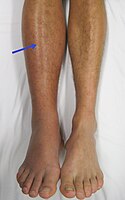
Photo from wikipedia
Cancer-associated venous thromboembolism (VTE) is a common complication of malignancy. Patients with cancer exhibit risk factors for both recurrent VTE and major or minor bleeding. Direct oral anticoagulants (DOACs) are… Click to show full abstract
Cancer-associated venous thromboembolism (VTE) is a common complication of malignancy. Patients with cancer exhibit risk factors for both recurrent VTE and major or minor bleeding. Direct oral anticoagulants (DOACs) are an attractive treatment option; however, there is a lack of consensus among national guidelines for choice between DOACs and LMWH, agent selection, dosing strategy, and duration of anticoagulation. Characteristics of the thrombotic event, the malignancy, the patient, and the anticoagulant must be considered. A systematic search of online databases was performed to identify literature on the management of cancer-associated VTE. Multiple controversies remain surrounding the optimal treatment of cancer-associated VTE.
Journal Title: Journal of Oncology Pharmacy Practice
Year Published: 2021
Link to full text (if available)
Share on Social Media: Sign Up to like & get
recommendations!